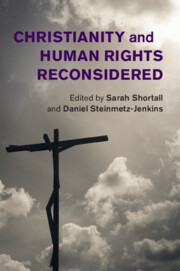Book contents
- Christianity and Human Rights Reconsidered
- Human Rights in History
- Christianity and Human Rights Reconsidered
- Copyright page
- Contents
- Figures
- Contributors
- Preface
- Acknowledgments
- Introduction
- Part I General Reflections
- Part II European Catholicism and Human Rights
- Part III American Protestant Trajectories
- Part IV Beyond Europe and North America
- 10 On Chinese Rites and Rights
- 11 “Expert in Humanity”
- 12 Neoliberalism, Human Rights, and the Theology of Liberation in Latin America
- 13 Two Sudans, Human Rights, and the Afterlives of St. Josephine Bakhita
- Index
12 - Neoliberalism, Human Rights, and the Theology of Liberation in Latin America
from Part IV - Beyond Europe and North America
Published online by Cambridge University Press: 26 September 2020
- Christianity and Human Rights Reconsidered
- Human Rights in History
- Christianity and Human Rights Reconsidered
- Copyright page
- Contents
- Figures
- Contributors
- Preface
- Acknowledgments
- Introduction
- Part I General Reflections
- Part II European Catholicism and Human Rights
- Part III American Protestant Trajectories
- Part IV Beyond Europe and North America
- 10 On Chinese Rites and Rights
- 11 “Expert in Humanity”
- 12 Neoliberalism, Human Rights, and the Theology of Liberation in Latin America
- 13 Two Sudans, Human Rights, and the Afterlives of St. Josephine Bakhita
- Index
Summary
This chapter examines the historical and normative contribution of Latin American theologians and religious actors attentive to the neoliberal underside of the human rights breakthrough associated with the Carter administration and the Trilateral Commission. By tilting the axis to the global South, this chapter charts the emergence of an alternative liberationist discourse and praxis of human rights for the Catholic Church in Latin America centered on the concrete struggles of oppressed peoples and the preferential option for the poor. In contrast to the global human rights politics of the 1970s, the liberationist praxis of human rights critically analyzed socioeconomic inequalities as part of the Church’s effort to resist the overreaching powers of the national security state and the global market. The chapter turns to the case of El Salvador from the 1970s to the 1990s and the examples of Archbishop Óscar Romero and theologian Ignacio Ellacuría to illustrate this alternative liberationist praxis of human rights. Their life-giving opposition to structural violence embedded in old and new forms of colonialism injuring poor campesinos brought them into direct conflict with the moral doctrine of human rights from the global North linked to US interventionism supportive of national securitization and later neoliberal policies.
Keywords
- Type
- Chapter
- Information
- Christianity and Human Rights Reconsidered , pp. 238 - 260Publisher: Cambridge University PressPrint publication year: 2020

